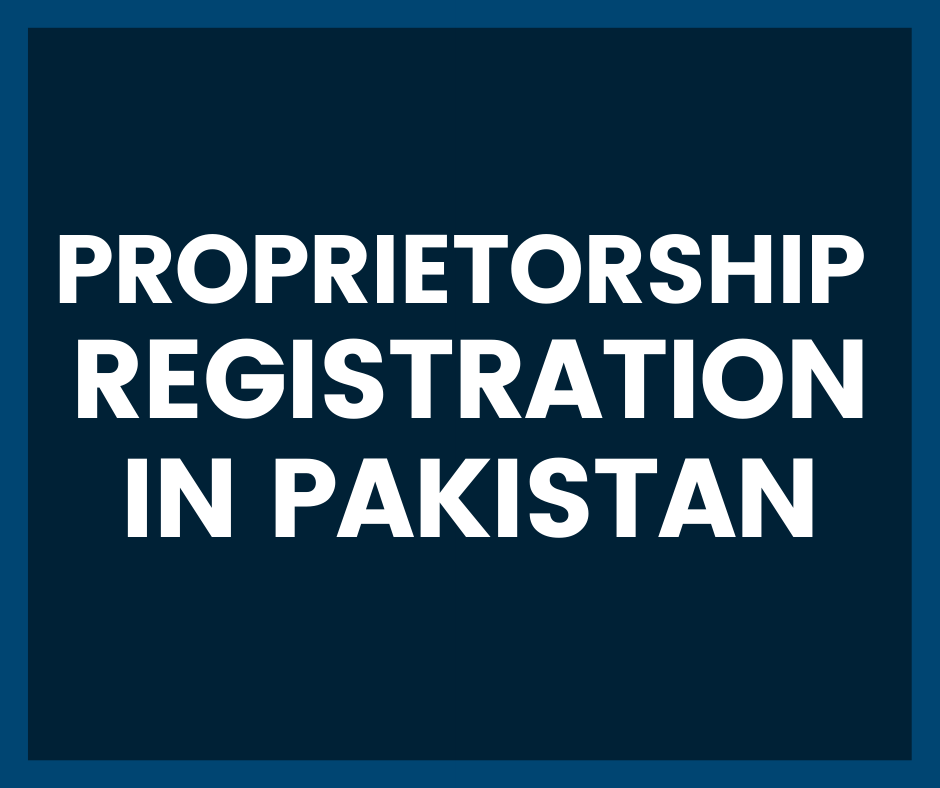Sole Proprietorship
Firm Registration in Pakistan
Sole Proprietorship Registration in Karachi, Islamabad, Rawalpindi & Lahore, Pakistan
Sole Proprietorship can be Register Online
Sole Proprietorship Registration: Proprietorship Firm Registration in Pakistan. Proprietorship Registration in Karachi, Lahore & Islamabad, Pakistan. A sole proprietorship can be registered online with the Federal Board of Revenue (FBR). One of the business types in Pakistan is a proprietorship, also known as a sole proprietorship. The sole proprietorship is one of the most common types of business, which is run and managed by only one individual. Establishing a business as a sole proprietor requires a NTN (National Tax Number).
Sole Proprietorship or Sole Tradership
Definition of Sole Proprietorship
A sole proprietorship is a business structure in which a single person owns the company and is responsible for all business decisions. This type of entity is also called a one-person business.
Features of Sole Proprietorship
The sole proprietorship is a small and simple form of business structure. It has no separate legal entity and is owned by one person. A sole proprietorship is the simplest way to start a business, since it does not require much formal setup or registration with the Registrar of Companies (SECP).
For example:
-
You can start your own hair salon in your home, as there are no restrictions on where it should be located. You can also hire employees to work at the same location, as long as you have adequate space for this purpose.
-
The only problem with this type of business structure is that if something goes wrong in your company or if there’s some sort of financial difficulty, all your personal assets may be at risk because they’re tied up with everything else in the business venture. For example, if someone sues you because they got hurt while using one of your products/services, then all their expenses would be recoverable against any claims made against them via their insurance policies! This means that even if they win their case against The Company Inc., whoever owns The Company Inc., loses theirs…and vice versa I’m afraid!
Advantages of Sole Proprietorship Firm
The ease of starting and operating a sole proprietorship is one of its biggest advantages. A sole proprietorship can be formed without a formal filing or notification to any government agency. The owner makes all decisions directly related to running the business, which gives him/her direct control over it. Because there are no legal formalities required, the costs involved in forming a sole proprietorship are lower than those required for other types of businesses.
More Advantages of Sole Proprietorship Firm
-
No partners, so you can make all the decisions.
-
You have 100% control over your business, and no one else can interfere with that.
-
Because there are no partners, you don’t have to share profits or losses with anyone else. You get all the profits from your business, and you take on all the losses as well.
-
You can change your mind about what kind of work you want to do at any time without having to consult with anyone else because this is your own personal enterprise, and it’s entirely yours!
The owner of a sole proprietorship will also enjoy greater profits than with other types of businesses because he/she has direct ownership of the company’s assets and profits. The Internal Revenue Service (IRS) requires less paperwork from sole proprietorships than from corporations or partnerships; therefore, they can pay fewer taxes overall on their own income tax returns (no separate income tax return is required).
A sole proprietorship has no audit requirement.
Disadvantages of Sole Proprietorship
A sole proprietorship has also a disadvantage because you have limited resources and unlimited liability. As a sole proprietor, if you get sued, the judgment will be against your personal assets and possibly your home. This can ruin your credit score, affect your ability to borrow money, and make it difficult for you to buy the property or otherwise grow your business in the future.
Additionally, as a sole proprietor there is no continuity of business ownership: If something happens to you—you die—the business dies with you unless someone else steps up as the owner. This doesn’t happen in other types of businesses like corporations, where stockholders can pass along their shares upon death. In those cases, there’s always someone else who owns some part of the company after an owner dies or sells their shares; however, this doesn’t happen with sole proprietorship because there’s only one owner/shareholder who holds all rights over everything related directly back into themselves rather than splitting profits amongst multiple owners/shareholders who would all own equal portions according to how much they paid when they bought their stock certificates (aka shares).
Difference between a sole proprietorship firm and a Single Member Company (SMC)
If you’re thinking of creating a business, it’s important to know the difference between a sole proprietorship and a Single Member Company (SMC). While both are types of company structure, they’re not the same.
A sole proprietorship is not a type of company, but an SMC is a company, which means an independent legal entity.
Before you start your business, be sure to do thorough research into the type of company structure that best suits your needs.
A company structure is defined as the manner in which a business is organized and operated. There are different types of company structures, some of which include: sole proprietorship, LLP (Limited Liability Partnership), PLC (Public Limited Company), and private limited company.
Sole Proprietorship is the Simplest Form of Business
A sole proprietorship is the simplest form of business establishment because it does not require any registration with the government or tax authorities. It also means that all your personal assets are at risk if your business fails or gets sued by someone who has suffered losses due to an error on your part or negligence on behalf of your employees. The benefit of having a sole proprietorship is that it doesn’t involve any legal paperwork since there’s only one person involved in running the business; hence, this type of structure is often referred to as “pass-through” taxation—meaning income taxes are passed directly onto you as an individual rather than being paid by an incorporated entity such as those listed above! This means there’s no need for annual reports or audits either… just keep good records, so there aren’t any surprises come tax season!
Sole Proprietorship Firm is Not a Separate Entity
Process of Registration of a Proprietorship is Simple
A sole proprietorship cannot be called to as a company, rather it is just an individual’s NTN showing business name and activity. Business owners are solely responsible for the profits and losses of the business; there is no separate legal entity. They are also responsible for the business’s debts and liabilities. Business decisions are entirely at the owner’s discretion. Business taxes are paid by the owner of the business through their personal tax returns. The marginal tax rate for sole proprietors is lower.
A sole proprietorship can be registered online with the Federal Board of Revenue (FBR). The process of forming a sole proprietorship is straightforward. For a sole proprietorship, you must submit a specific business name. As part of the NTN registration, be sure to select your business activity. You can register a sole proprietorship the same day. Your NTN will appear online within 24 hours. You can register your NTN online for free, there is no charge for this.

Sole Proprietorship-the Most Popular Business Type
A proprietorship can be Registered Online with the FBR
If you’re considering starting a new business in Pakistan, you should know that there are several ways to register your business. The most popular option is a sole proprietorship, which can be registered online with the Federal Board of Revenue (FBR).
Sole Proprietorship Firm Requires an NTN only
Sole Proprietorship cannot be Called as a Company
The sole proprietorship is one of the most common types of business, which is run and managed by only one individual. Establishing a business as a sole proprietor requires an NTN (National Tax Number). A sole proprietorship cannot be referred to as a company, rather it is just an individual’s NTN showing business name and activity.
Lower Tax Rate on the Sole Proprietorship Firm
Proprietary Business owners are responsible for the profit and loss
Proprietorship Business owners are solely responsible for the profits and losses of the business; They are also responsible for the business’s debts and liabilities. Business decisions are entirely at the owner’s discretion. Business taxes are paid by the owner of the business through their personal tax returns. The marginal tax rate for sole proprietors is lower than it would be if they owned any other type of corporation or Private Limited Company (Limited Liability Company).
Starting a Sole Proprietorship Business is Easy
To Start Own Sole Proprietorship, You Must Register with FBR
Starting a business as a sole proprietorship is easy. You just have to complete the required paperwork. However, there are some things you should know before starting your business as a sole proprietor.
If you want to establish your own sole proprietorship in Pakistan, then you must register your business with FBR first.
Required documents for Sole Proprietorship Registration:
- Business name & activity
- Copy of NIC
- Recent electricity or gas paid bills
- Lease deed of the premises
How TAXOCRATE can help you register your Sole Proprietorship Business?
Taxocrate (Pvt) Limited can help you register your sole proprietorship in Pakistan. Our team of experts will guide you through the entire process, so you can rest assured that all legal matters regarding your business will be taken care of. We have more than 36 years of experience providing corporate services such as Company Registration, Firm Registration, Proprietorship Registration, Trademark Registration and Income and Sales Tax Returns to our clients all over Pakistan. For further queries regarding the above-mentioned matters, please leave a message in the comment box given below. For personalized consultation and guidance, call us by dialing 0331-6644789 or emailing us at info@taxocrate.com.
Contact Us
Popular Service
Provincial Tax Authorities
Misc. Services
Recent Article
-
Company Registration | Company Registration in Karachi, Islamabad/Rawalpindi & Lahore, Pakistan
-
Income Tax and Sales Tax Return Filing Services| Our Expert Corporate Lawyers In Karachi
-
Corporate Lawyers’ Need at Business Hub, Karachi
-
Additional Sales Tax Imposed
-
Comprehensive Guide to NTN (National Tax Number) Registration in Pakistan
-
Income Tax Return Filing in Karachi By Top Tax Lawyers of Pakistan
-
Trademark Registration in Karachi Safeguarding Your Business Identity
-
Taxation Trust Tax Lawyers Consultants
-
Mahr The Dower Money a Symbol of Commitment and Financial Responsibility
-
Calculating Income Tax As Per Income Tax Ordinance 2001
Disclaimer: All information is provided on this portal solely for informational purposes. This portal is not affiliated with the Government website. Please note that this disclaimer also applies to our website, and we may refer to it as ‘us’, ‘we’, ‘our’ or ‘website’. The information on the website has been gathered from various government and non-government sources. We disclaim any liability for errors, injuries, losses, or damages arising from the use of this information. We also disclaim any liability for the availability and authenticity of this information. Our services consist of filling out forms, providing legal advice, and assisting our clients. The departmental processing of the registration forms is not our responsibility. You will have to use a service fee for professionally preparing your application, submitting it to the relevant authorities, and coordinating your application process. You will have to pay any Government fees.
